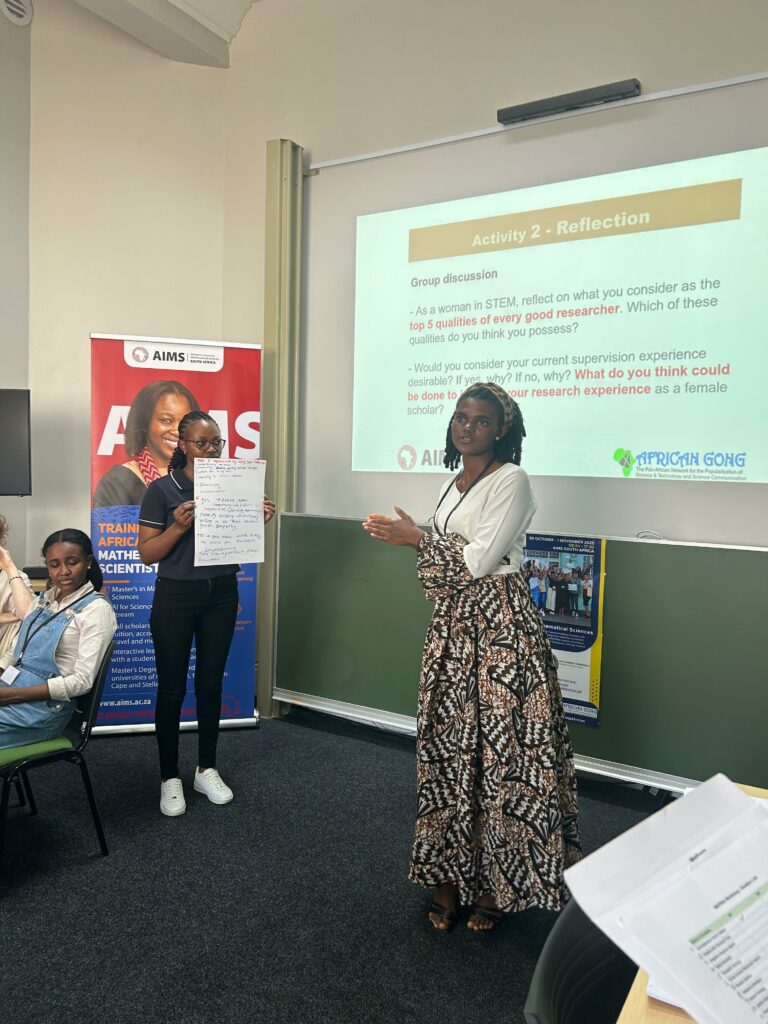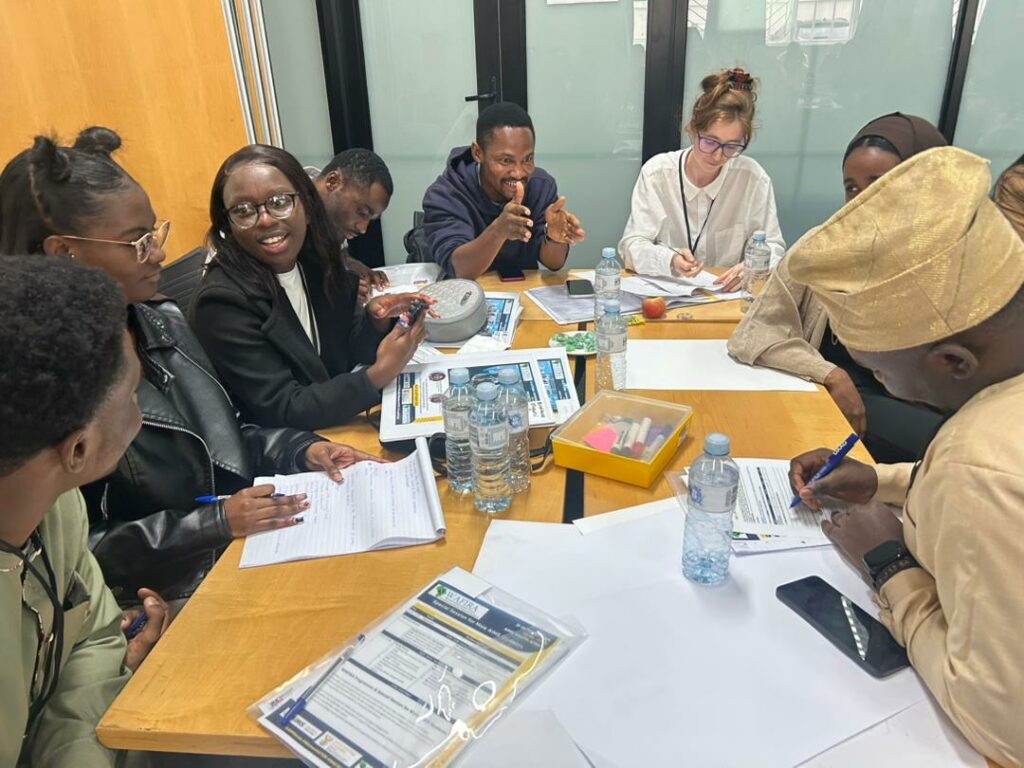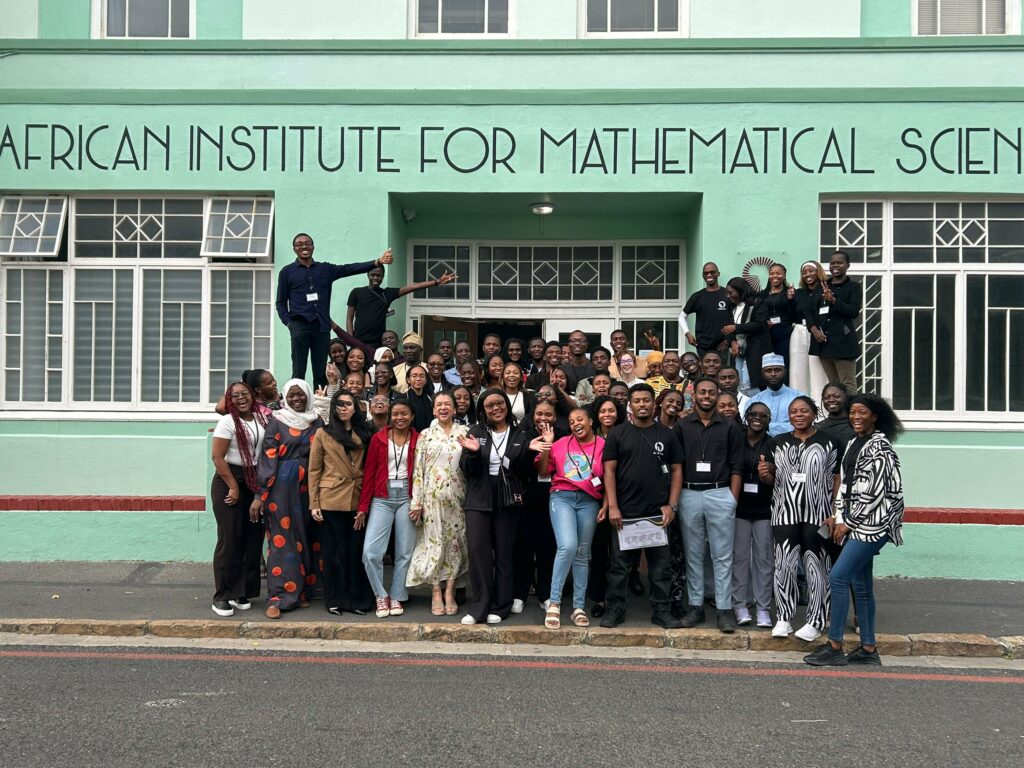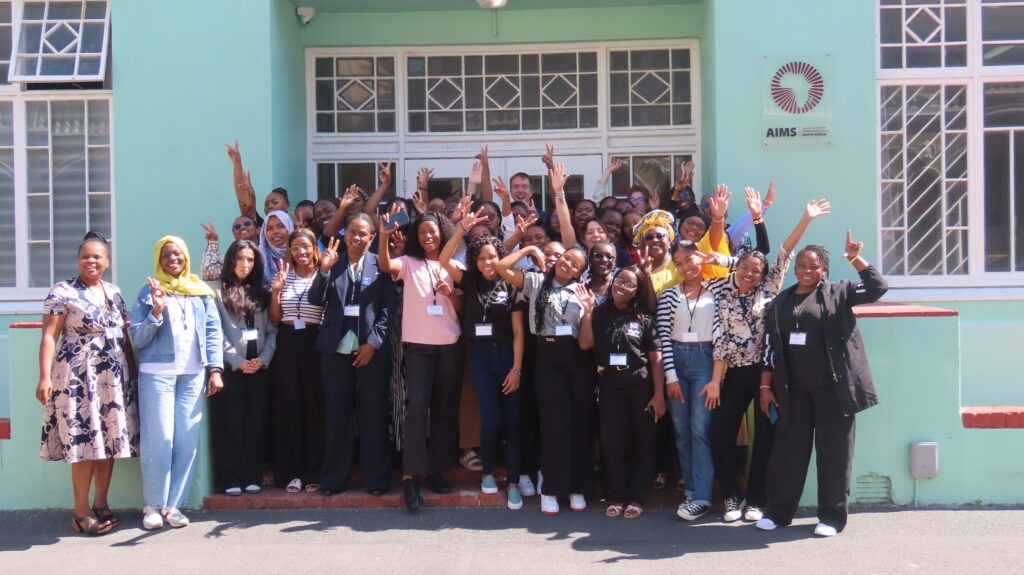At AIMS South Africa, we believe that gender equality and inclusion in STEM – across academia, research, and industry are fundamental to strengthening the National Systems of Innovation (NSI) and advancing Africa’s transformation agenda. These priorities are also central to achieving equity and the UN Sustainable Development Goals. Yet, gender disparities in STEM continue to persist across the continent, influenced by deep-rooted policy, institutional, systemic and sociocultural factors.
In response, AIMS South Africa, in partnership with African Gong (the Pan-African Network for the Popularization of Science & Technology and Science Communication), has adopted a comprehensive and targeted capacity-building programme: the Women’s Advancement Forum – International Exchanges, Research & Academia (WAFIRA), as a paradigm-shifting good practice framework to engender institutional change, and to empower its female students.
WAFIRA is uniquely designed by African women, drawing on the lived realities, strengths, and challenges of African women in STEM to radically shift the under-representation and enhance support structures for women in STEM across the continent. The programme equips participants with the skills, confidence, leadership drive, agency, and networks needed to advance their academic and professional trajectories across research, higher education, and industry. Since its inception in 2014, WAFIRA has been delivered in multiple African countries, benefitting over 1,500 women academics and researchers.
The third WAFIRA Workshop was held from 30 October to 1 November 2025 at AIMS South Africa in Muizenberg, convening 40 young and emerging women researchers and academics in the mathematical sciences. Held under the theme “Advancing African Women in Mathematical Sciences”, the workshop included Honours, Master’s, PhD and Postdoctoral participants from AIMS South Africa (18), the University of the Western Cape (1), UNISA/iThemba LABS (6), and Sefako Makgatho Health Sciences University (15), joined by the Head of the Department of Mathematics and Applied Mathematics. There were also contributions from WAFIRA alumni from the 2023 and 2025 cohorts, and experts in gender equity in STEM, who served as role models and mentors for an inspiring capacity-building experience.

This year’s programme also introduced a new and significant component: an engagement session for male AIMS students. The session was designed to strengthen their capacity to become informed allies and co-leaders in fostering gender equity, promoting collaborative norms, and contributing to a more inclusive and supportive academic environment at AIMS.
Prof Ulrich Paquet, Director of AIMS South Africa; Prof Karin-Therese Howell, Academic Director; Ms Mandry Ntshani, Director of Africa Multilateral Cooperation at the Department of Science, Technology and Innovation (DSTI) in South Africa, Dr Elizabeth Rasekoala, President of the African Gong, and Dr Rejoyce Gavhi-Molefe, AIMS South Africa House of Science Manager, gave Introductory Remarks on the first day of the workshop
Welcoming the participants, the keynote speaker, Ms Ntshali, highlighted the DSTI’s commitment to strengthening an inclusive NSI in South Africa and across the continent. She emphasised the importance of initiatives such as WAFIRA, the African Girls Can Code Initiative, the Academic Advancement Programme (NRF), and the Women in Innovation, Science and Technology Portal, which collectively support skills development, mentorship, leadership pathways, and gender transformation. She also stressed the importance of involving historically disadvantaged institutions and creating continental networks and opportunities for women in STEM.

| “We are excited about initiatives like WAFIRA because they are grooming the next generation of women leaders, especially by engaging participants from historically disadvantaged institutions, and helping build an inclusive continental network for women in STEM. The number of women researchers is growing, but we still need more women in leadership and a national innovation system that truly leaves no one behind.” |
Prof Paquet highlighted the disparities in gender in STEM representation across Africa, citing data from various countries based on experiences from the Deep Learning Indaba’s IndabaX programme and reminded participants that the future of STEM in Africa will be shaped by the next generation of women leaders, through the capacity-building and mentoring initiatives of the older generation handing over the torch. He emphasised the enduring power of women’s collective and communal efforts in driving and advancing change, noting that meaningful progress is never achieved alone.
| “No one builds a vision by themselves. It takes a village — and you are now that village. We may not be the next generation, but you are. You are the women who will carry the torch forward and shape the future of Africa.” – Prof. Ulrich Paquet |
Dr Rasekoala reminded participants that WAFIRA was initiated by senior African women in STEM through volunteer leadership, collective action, and the belief that change must be driven from within African institutions — not imposed from outside. She challenged the participant cohort to take ownership of the next phase of the movement, noting that in other regions of Africa, former participants now lead their own WAFIRA chapters and institutional reforms.
| “No one does this alone. WAFIRA was built by women who worked through the night because they believed in a future that didn’t yet exist. Five years from now, you should be the ones running it — because you are the next generation of leaders on this continent.” – Dr. Elizabeth Rasekoala |
Prof. Howell’s message also reminded the participants to embrace the power of community, invest in one another, and recognise their ability to drive inspirational change.
| “Never underestimate the power of the networks you are building here. One movement creates a ripple — and each of you will carry that ripple forward into every space you enter.” – Prof Karin-Therese Howell |
Over the three days, participants engaged in hands-on, minds-on, informative, transformative, mindful, and highly interactive sessions, discussions and reflections facilitated by Dr Rejoyce Gavhi-Molefe and Dr Elizabeth Rasekoala.
The three-day WAFIRA workshop offered a focused programme on strengthening academic, research, and career pathways for emerging women in mathematical sciences. Participants began with reflective sessions on identifying and leveraging personal foundational strengths to project transformative pathways for leveraging their academic and career advancement and progression, followed by an innovative Day 2 dialogue with WAFIRA Alumni and mentors as well as on allyship, where male AIMS students joined the conversation to explore their role in fostering equitable and inclusive STEM environments. The final day featured practical exercises on designing transformative and empowering self-image and branding toolkits to advance and enhance the post-WAFIRA journey insights for career progression, professional, and personal development. This culminated in participant presentations of their advancement roadmaps and a certificate ceremony.

Dr Juliet Nagawa, a Postdoctoral Research Fellow at the University of Cape Town and a 2023 Alumni of WAFIRA-SA1; Ms. Thembelihle Dlamini, a PhD candidate at the University of Augsburg, Germany and also a 2023 Alumni of WAFIRA-SA1; and Ms. Sophy Kgoahla, an MSc student at AIMS South Africa and a 2025 Alumni of WAFIRA-SA2, shared their personal experiences and the significant impact of WAFIRA on their personal and professional advancement and development. They served as role models and shared testimonials as to how the WAFIRA program transformed their self-confidence, career advancement, and empowered their perspectives as emerging African women scientists.
Additionally, Ms Ylaney Ramlall, a senior industry leader and Reinsurance Client Relationship Manager at Santam, provided practical strategies and mentorship, along with valuable insights drawn from her own experiences. She emphasized how mentorship, particularly in the mathematical sciences, can be leveraged for personal and professional growth, enhance employability, improve career mobility, and create a broader societal impact.
Workshop Outcomes and Participants’ Testimonials
| “The WAFIRA workshop was life-changing for me. The organisation was really great and the programme content was really active. I spent a great moment with my group members, and I‘m leaving here as a changed person. I learned more about myself, I learned how to ask for help through mentorship. I reflected on my strengths and weaknesses, no excuses, just do it. We are our own drivers. I need a mentor who can guide me in my decision-making and I need funding to go on that plane. I also need more opportunities to be empowered” |
| “A lot of self-introspection. I was made to look more into who I am and what and who I want to become. “Leadership is about getting people to do things that they don’t want to do” and every leadership style has pros and cons. I was able to apply what I’ve learned to everything that is currently happening in the world. Politics, to be specific. Another key takeaway is the importance of leveraging international exchange for career progression.“ |
| “The conversations were honest, uncomfortable, inspirational and transformational. I am more confident and self-aware, and also much respectful of the openness of my fellow participants. I got more confidence. I got to address and admit my insecurities. I’ve been inspired to embrace my strengths. I’ve been guided on how to transit different career stages and also how to handle challenges and biases we face as women in STEM. Mental health is important. This workshop has been therapeutic. I’ve been inspired to reflect on my strengths, insecurities and also been enlightened and affirmed that “I can do it in spite of”. Very grateful to Dr Rejoyce & Dr Rasekoala for the wonderful workshop!! Blessings to you!!” |
| “My benefits from the WAFIRA male workshop were basically getting to understand the roles both males and females need to play incoming to reach a consensus about gender equality for both men and women. We can transform our gender equality, on collective male peer leadership for change through activism, voice and advocacy. We can be the agents of transforming gender equality by troubleshooting (advocacy) and finding solutions. This can be done on a higher level through activism.“ |
| “Presenting the state of the art on the participation of women in STEM over the past 10 years, It was eye-opening to see what needs to be done. We men really have to change our perspective and gender biases throughts towards our female peers. We need to elaborate collective actions in order to support females achieve gender equality rather than pushing them forward in the name of equity. We need to foster dialogue and communication to sort out this issue. A lot of communication and debates need to be carried on more often to agree one day on a common consensus. Due to our cultural backgrounds, it will be difficult to agree easily on a common consensus, but we should keep working on it by organizing more workshops.” |
Ms Lavender Akinyi Ayako, Mr Dagmawi Misker Gedamu, Ms Khadiga Edarzi, Master’s students at AIMS South Africa and Ms Sindiswa Mnguni Master’s student at SMU, directed the workshop as part of their leadership training. Special thanks to the House of Science student volunteers who assisted with logistics as part of the “pay it forward” activity. See Lavender’s testimony on the benefit of WAFIRA.” Lavender’’s testimonial


